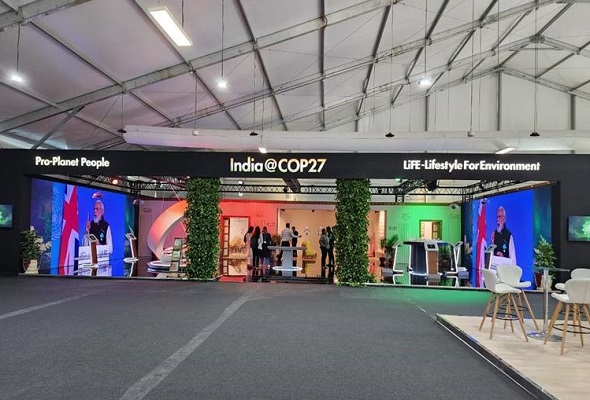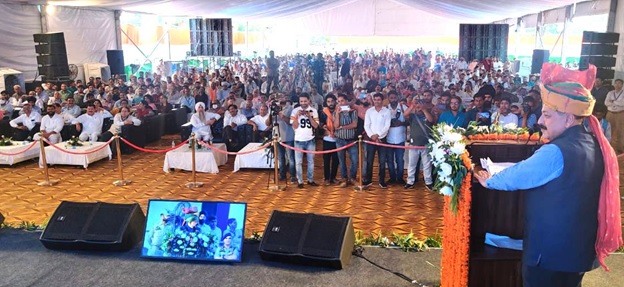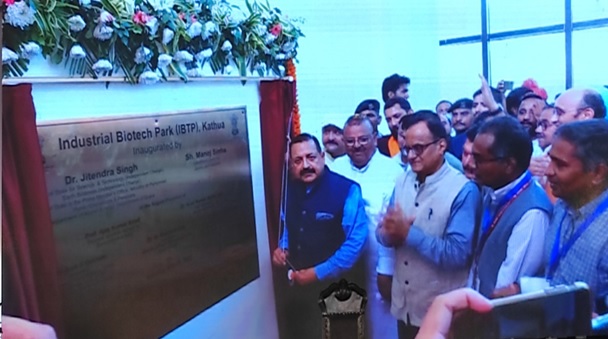
India Pavilion at COP 27 held at Sharm-El-Sheikh, Egypt. Image Source- MoEFCC
Currently, the world is amidst intense dialogue with one another on the defining global challenge humanity faces- climate change. This year, the ongoing 27th session of the Conference of the Parties (COP 27) of the United Nations Framework Convention on Climate Change (UNFCCC) is hosted by the Government of Egypt at Sharm-el-Sheikh from 06th-18th November 2022.
On this global platform, countries Party to the Convention have gathered to make concrete decisions and discuss further courses of action toward achieving the world's collective climate goals as agreed under the Paris Agreement and the Convention. Aligning with the Theme of COP27- 'Delivering for people and the planet' the conference brings together the countries and reinstates and delivers on the commitments made under the Paris Agreement for combating the grave challenges of our time; high greenhouse gas emissions, growing energy crisis, and rapidly increasing extreme weather events.
Countries must focus on concerted and collective actions and policies focused on building climate resilience and adaptation, reducing greenhouse gas emissions, promoting innovation and discovery of methods, sustainable practices, and technology, conserving and protecting nature and biodiversity, and delivering on the financial commitments for climate actions, mitigation, and adaptation.
In the ongoing COP27, the Union Minister of Environment, Forest and Climate Change, Bhupender Yadav, inaugurated India Pavilion and conveyed India's commitment to combat climate change. He shared the vision of Prime Minister Narendra Modi on the mission ‘LiFE- Lifestyle for Environment' to confront the issue of climate change. LiFE, as explained by him, is adopting an environmentally conscious lifestyle, a pro-planet people approach.
Prime Minister Modi introduced LiFE in COP26 (held in Glasgow, United Kingdom,2021), to unite individuals and communities to protect and preserve the environment. It embraces a sustainable lifestyle focused on 'mindful and deliberate utilization, instead of mindless and destructive consumption' to protect, conserve and preserve the environment.
Currently, the world is amidst intense dialogue with one another on the defining global challenge humanity faces- climate change. This year, the ongoing 27th session of the Conference of the Parties (COP 27) of the United Nations Framework Convention on Climate Change (UNFCCC) is hosted by the Government of Egypt at Sharm-el-Sheikh from 06th-18th November 2022.
During COP27, aligning with the theme of LiFE, the India pavilion emphasized the significance and need to adopt sustainable and eco-friendly lifestyles. Showcasing the sustainable practices adopted by Indian civilization for centuries, it underlined cohesive living- an integration of traditional knowledge values and practices in our daily life, which is in harmony with nature. A change in not only our outlook but also the way we choose to live is a prerequisite for tackling the issue of climate change.

Shri Bhupender Yadav, addressing the gathering about India LiFE Campaign at COP27, Egypt (Photo: MoEFCC)
Mission LiFE seeks to translate the vision into action to mobilize at least one billion Indians and other global citizens to take individual and collective action to protect and conserve the environment in 2022–28. It aims to make at least 80% of all villages and urban local bodies environment-friendly by 2028. Based on a collective approach to sustainability, the LiFE campaign is divided into three steps- (1) change in demand (promoting and encouraging environment-friendly actions at individual, community and global levels), (2) change in supply (promoting and encouraging industries to respond and develop tailor made environment-friendly solutions), and (3) change in policy (promoting and encouraging shift in industrial and government policies that support both sustainable consumption and production).
Given the global commitment to achieve the Sustainable Development Targets 2030, LiFE was launched in the 75th year of India's independence. A comprehensive and non-exhaustive list of 75 measurable LiFE actions are listed under seven categories; energy saved, water saved, single-use plastic reduced, sustainable food systems adopted, waste reduced, healthy lifestyle adopted, and e-waste reduced.
India has been at the forefront and proactively marching towards its commitment to cooperate in combating climate change impacts that were collectively agreed upon under the UNFCCC, Kyoto Protocol, and Paris Agreement. Keeping to its duty of protecting India's interests while safeguarding the development needs based on the principles of United Nations Framework Convention on Climate Change (UNFCCC), India submitted its Long-Term Low-Carbon (Greenhouse Gas) Emission Development Strategy (LT-LED). The document entails India's vision, approach, and strategy in the short-term and long-term action plans for achieving Nationally Determined Contribution (NDC) goals by 2030 and the target of net zero emissions by 2070.
An inclusive and integrated approach based on Common but Differentiated Responsibilities and Respective Capabilities (CBDR-RC), climate justice and equity along with development in research and innovation, ease in technology transfer, effective utilization of climate financial resources for the development of new sustainable technologies, building climate adaptation and resilience, strengthening of governance and institutions for climate actions and reinforcing international cooperation are prerequisites and is imperative to fulfil the vision of climate-resilient and sustainable future.
With its strategy of LiFE for confronting the challenge of climate change, India is moving ahead. It urges every individual and community, leaving no one behind, to move forward and together in this global mass movement.
India Science Wire
ISW/AD/MoEFCC/COP27/Eng/16/11/2022





